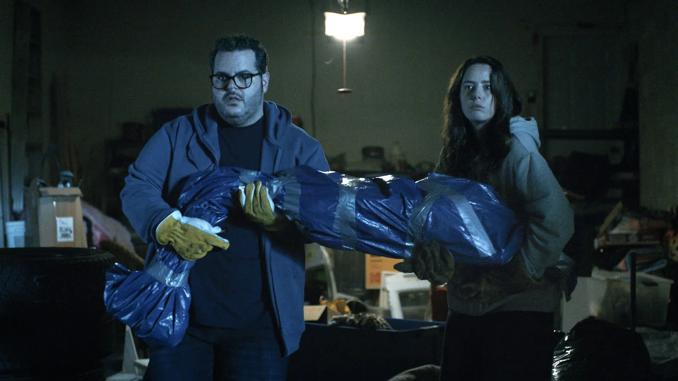Alex Winter’s Pitch Black Humor Veils Family Sins in Adulthood

There is a certain unintentional but nevertheless nigh-universal cruelty to the self-centeredness of children. You can’t blame them for thinking almost entirely of themselves; they have smooth little brains still in the process of developing into fully functional, self-actualized adults. When kids look at their parents, they tend to see them as people only in relation to themselves–they live in a household with “my Mom” and “my Dad.” That these people have led entire lives without them up to this point is something a kid knows intellectually, but not emotionally: They can’t imagine the triumphs and travails of the very real life that preceded them. Nor can they imagine how dark things may have gotten for Mom and Dad in those supposed halcyon days. Alex Winter’s pitch black fusion of comedy and thriller, Adulthood, digs up all that buried unpleasantness, demonstrating how the next generation is always priming itself for its own fall from grace.
Adulthood–which really could have used a more distinctive name, because good luck making the viewer think first of this project when they hear that single word–stars Josh Gad and Kaya Scodelario as Noah and Megan, two adults who are made to reckon with a spiraling web of deception (and eventually murder) when their parents’ buried secrets come to light. The two siblings aren’t close, and their lives have diverged in the last handful of years: Noah is a struggling screenwriter in L.A., barely scraping by as he waits for a break that surely is not coming at this point, while Megan is a hustling, married mother of two who attempts to balance a kitschy online business with a particularly vulnerable child. Neither has much time for their frail mother Judy (Ingunn Omholt), who in the film’s opening moments suffers a stroke that lands her in the hospital, attended by her live-in nurse Grace (Billie Lourd). It also brings both Noah and Megan back to the house where they grew up, which is where all the trouble begins … or perhaps where it began, 30 years earlier.
You see, there’s a corpse in the wall, and it’s going to be a bit of a problem. This isn’t a spoiler; not really–within the first 8 minutes of Adulthood, Noah and Megan are already finding themselves in a debate about what to do about the newly discovered body, which they recognize as a former neighbor who went missing in 1996. The film, in fact, sort of rushes through some of this material that you would expect it to really make a meal of–it does not take the pair long at all to conclude (with some very wonky logic the writer would prefer for you not to question) that they need to dispose of the body in order to protect their family legacy and vested financial interest in Mom’s house, and the actual disposal happens as part of a montage I at first wasn’t even certain was actually happening, or simply being workshopped aloud. But it’s all setting the stage for the true nature of Adulthood, which is a Coen-lite game of criminal and occasionally comical one-upsmanship, as Noah and Megan fight to keep a snowballing series of boneheaded mistakes from revealing everything–especially once they call in the more criminally fluent assistance of their estranged cousin Bodie (Anthony Carrigan), here playing a more scuzzy version of Barry’s NoHo Hank, dressed in dirtbag rather than metrosexual regalia.
One thing that works pretty well is the connection between Gad and Scodelario’s characters, not necessarily in the sense that they make the most believable siblings, but in the way that the film establishes them in one place and then pushes each of them into territory they never thought they would inhabit. Gad can be an overbearing comic presence, but he’s appreciably restrained here as an Alamo Drafthouse shirt-wearing loser whose lack of empathy for his mother and covetous need for a payday make it easy for him to rationalize the need for some dirty work to keep things under wraps. Scodelario, on the other hand, is written as far more sympathetic at first, the harried mother who is additionally burdened by a diabetic son, complete with constant phone monitoring of the kid’s blood sugar. She’s clearly never able to step away for even an instant, and the empathy the screenplay designs for her here is a tad cheap, ultimately not well threaded into the more grim side of the narrative, but it gives her a distinct place to start from as the mounting weight of necessity tears down the walls of what both Noah and Megan would have sworn they would or would not do for the sake of their own self-interest. The further Adulthood pushes them, the more the two diverge in interesting ways–and rest assured, it does turn pretty dark, in a pleasantly twisted sort of way.
-

-

-

-

-

-

-

-

-

-

-

-

-

-

-

-

-

-

-

-

-

-

-

-

-

-

-

-

-

-

-

-

-

-

-

-

-

-

-

-








































